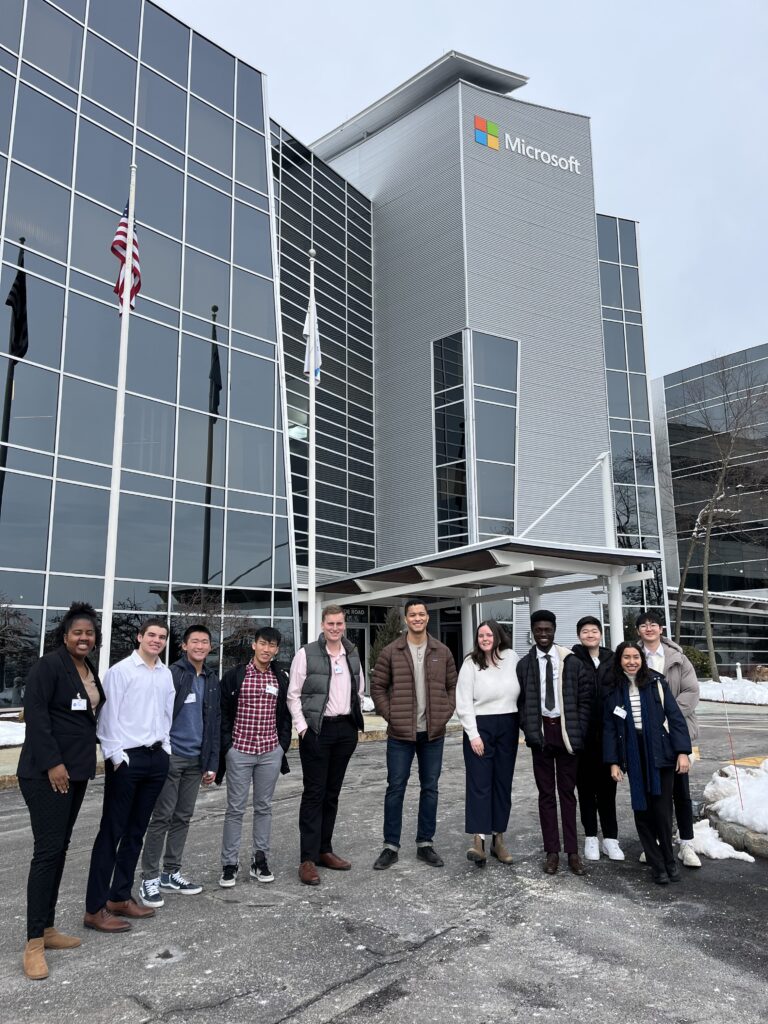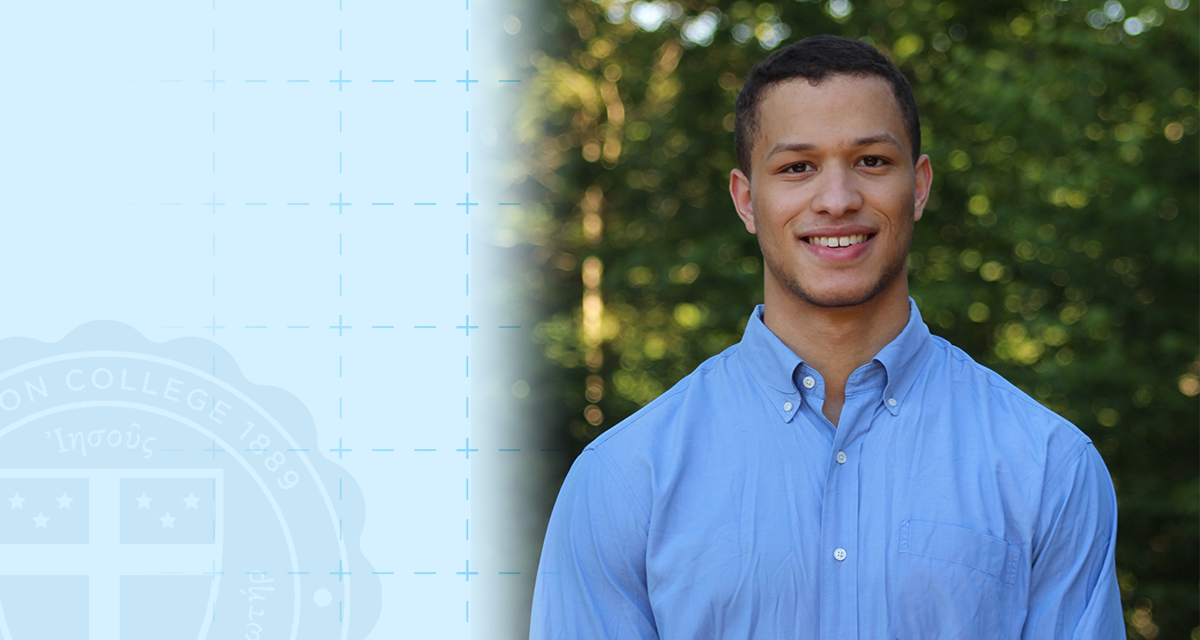From Gordon to Microsoft: Ari Dospassos ’21 Shares Insights on Software Engineering
Ari Dospassos ’21, who studied computer science at Gordon, now works as a software engineer at Microsoft. We sat down with him to ask about his job working in software and technology, as well as his passion for computer science.
What are some trends in the software engineering industry happening right now?
We can’t avoid talking about artificial intelligence (AI) because the emphasis is immense. There was AI before, but it was mostly single-purpose algorithms. Then large language models rose up; people started adding a ton of data to train these models. These are what created the breakthrough for ChatGPT and other generative AIs, and they got so good it was scary. The switch flipped. Now AI has started to sound like something a computer shouldn’t, sending back information that sounds human-like and even reasoning with us. There’s way more capacity for these large language models, and they’re being deployed everywhere as huge models of data and information.
There’s also a big push for the internet of things (IOT). For example, a smart lamp connected to the internet that can also talk to the light switch, which all can send and receive data from each other to accomplish different things. This creates different opportunities for innovation. AI is much flashier than IOT, but IOT is going to be popular in the next couple of years.
How has your job in software engineering changed because of AI?
In the last year there have been developments that forced Microsoft to produce things at breakneck speed because of the opening of ChatGPT and generative AI. Chatbot AI and conversational AI got integrated instantly into Microsoft. Now there are a lot of copilots in Word, PowerPoint and even Teams. Adding these sidekicks to Microsoft’s software lets you navigate through the platforms, and you talk to the bots like a normal person. It’s like talking to someone who knows everything. I have a pilot coding assistant that has made me five times more productive overnight as a software engineer.
It’s both exciting and scary because the future is going to look different because of what’s happening right now. Everyone, not just people who work in software, should be looking ahead to how they’re developing themselves to be ready for that work and the changes that come with it. I think it’s going to make more jobs for people, but it will change how things work for sure.
What’s a common misconception you think people have about software engineering, and how would you debunk it?
One misconception is that a lot of people put an emphasis on how smart you must be to be good at computer science, but that’s such a limiting thing. I’m not the smartest guy in the room; I never was. But I got into Microsoft! And I’m getting good feedback on my work here. Things never came easily to me, but Gordon’s education was very good. Dr. Karl-Dieter Crisman, professor of mathematics and computer science, challenged me the most to grow. The classes were difficult, but if you work hard and ask for help, anyone can do it. Anyone can get into big tech; you don’t need to be super smart. Just work hard, get a good base understanding, keep climbing and keep learning.
How important is it to have diversity in computer science?

I’ve been at both ends of the spectrum, having worked at bigger and smaller companies. Microsoft puts a huge emphasis on diversity. There’s a little bit of everything, a lot of cultures I’ve never encountered before and now I’ve learned much about. These people have different perspectives and ideas because of their backgrounds; they’re some of the most brilliant people I’ve ever worked with. I’m Brazilian, but other coworkers on my team are from India, China, Turkey…from all over. The Clarendon Scholars program’s diversity training that I got at Gordon really does work with the environments I’ve been in. People of different cultures are coming together, and we’re learning how to navigate that while also realizing how much more we can accomplish as a team.
In software engineering diversity is very important for the ideas we bring to the table because it determines how well we’re able to develop things for the world. Someone at my company said something like, “Since we’re making things that are touching everyone in the world, and are instantly touched by millions of people, the team making these things should reflect the people our work touches.” Especially as Christians we should be in these spaces too. The world needs, to quote Dr. Russ Tuck, “Christian software engineers and scientists because we create things that have such an impact on the world, and we need to have a voice in this sort of work.”
What does your day-to-day look like as a software engineer at Microsoft?
I currently work at Microsoft’s Strategic Missions and Technologies Organizations. We focus on Microsoft’s federal businesses: Azure Space & Mission Engineering, Azure for Operators and Azure Quantum. I currently work under the Azure for Operators Team, which is a Microsoft telecommunications business. The work we do involves transporting existing 5G and 4G infrastructures into the Cloud to provide scalability, security and performance for existing mobile operators, such as AT&T and T-Mobile. I’m tasked with designing and creating systems and programs to do this work.
I work from home for the most part, which is nice. I’ll have a couple stand-up meetings to go over the progress of what we’re working on. The other half of the job is coding, being an engineer, testing and making those problems work. That takes about three hours of my day. I like the creative aspect of it; I have a lot of freedom to implement things so long as there’s a standard of quality. The job can be hard, but it can also be easy. I use a lot of coding languages: C-sharp, Python and shell script. But they don’t matter as much as people think; they’re tools, and you pick the right one to get your job done. Anyone could learn a coding language if they had to; no one on my team handles all the C-sharp problems or all the Python problems. We’re always learning and collaborating.
How did Gordon prepare you for your software engineering role?
Gordon was the best option for me because of the Clarendon scholarship I got. I needed a major that worked for me and would get me a good job. I was always a nerd who messed around with video games, so computer science interested me the most. But I had no experience with coding at all; Gordon helped me start from the ground up to become someone who can do the job and do it at a good level. It wasn’t easy, but I stuck to the curriculum, even though I was scared. At the end of my junior year, I started to feel confident in my skills and even started taking side jobs for people my senior year.
Some of the extracurricular courses at Gordon related to the computer science major challenged and taught me the most—internet programming, mobile programming. These courses were project based, with huge projects to do on your own, from beginning to end. You made the project your own way by designing your own solution: testing, coding, debugging different errors, coming up with solutions to issues. That’s how I work now at a real job. The professors helped but didn’t do any handholding, which was very beneficial for understanding the software development cycle.
 The Bell
The Bell